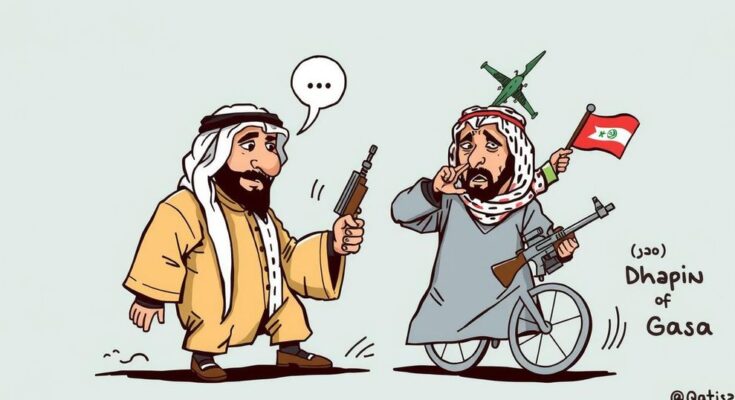The recent Qatari media campaign against the U.S. employs a series of derogatory cartoons that accuse the United States of enabling Israel’s military aggression in Gaza. These cartoons depict the U.S. as a malevolent force controlling global events, criticizing its political and military support for Israel while framing America as complicit in human rights violations against Palestinians. The portrayal of the U.S. as under Israeli control further emphasizes sentiments of dissatisfaction with American foreign policy in the Middle East.
In recent months, Qatari media outlets have engaged in a vigorous anti-U.S. campaign, particularly through the dissemination of politically charged cartoons. These illustrations serve to vilify the United States, accusing it of supporting Israel’s military actions in Gaza by providing military, political, and legal assistance. The portrayal of the U.S. is starkly negative, as it is depicted in various cartoons as a malevolent entity, frequently referred to with derogatory terms such as “cursed Uncle Sam” and “nation of heresy.” Such imagery paints the U.S. as a dominant force manipulating global events to its advantage while allegedly being complicit in the violence against the Palestinian population. The cartoons often depict a narrative whereby the U.S. is portrayed as integral to Israel’s aggression in Gaza, emphasizing the supply of arms and intelligence that ostensibly facilitate the ongoing conflict. Illustrations display President Biden and Prime Minister Netanyahu together attacking Gaza, underscoring the collaborative nature of their actions. One cartoon shows Uncle Sam inscribing a message of love on a rocket designated for Gaza, signifying a direct link between U.S. support and the violence inflicted upon the region. Moreover, the Qatari media not only conveys that the U.S. provides military resources but also underscores its role in legitimizing Israeli actions through political and legal backing. Cartoon representations of the Statue of Liberty erasing evidence of Israeli crimes illustrate this point vividly. Another cartoon implies that the U.S. facilitates violence by covering up the bloody ramifications of Israeli operations in Gaza. Such depictions frame the U.S. as not just an ally of Israel but as a key contributor to the maintenance of the conflict. Further, some cartoons suggest that Israel wields control over the U.S. itself, depicting American politicians as puppets under Netanyahu’s influence, thereby insinuating that American foreign policy is heavily dictated by Israeli interests. This narrative reinforces the sentiment of U.S. complicity in human rights violations occurring in Gaza, as the cartoons suggest a systematic undermining of Palestinian rights, amplified by U.S. support. In summary, the Qatari media’s campaign against the United States through these politically charged cartoons illustrates a profound discontent with U.S. foreign policy in the Middle East, particularly regarding its alliance with Israel, ultimately framing the United States as a key actor in the perpetuation of violence against Palestinians.
The Qatari media landscape has been noted for its critical stance towards the United States, particularly in light of recent geopolitical events involving Israel and Palestine. Qatar’s perspective on U.S. actions in the region is heavily colored by the ongoing conflict in Gaza, with many in the region perceiving the U.S. as complicit in Israel’s military operations. This sentiment is reflected in cartoons and articles published in Qatari newspapers that vehemently denounce American influence in the conflict. This backlash appears to be motivated by a combination of political alignment, regional solidarity with Palestinians, and a broader critique of U.S. foreign policy in the Middle East, which is often viewed through a lens of skepticism and hostility.
In conclusion, the Qatari media’s recent anti-U.S. campaign, particularly as demonstrated through provocative cartoons, underscores a significant backlash against perceived American complicity in Israel’s war against Gaza. By portraying the U.S. as a malevolent force that supports and legitimizes violence against Palestinians, these publications reflect a broader regional sentiment that criticizes U.S. foreign policy and advocates for Palestinian rights. This media portrayal plays a crucial role in shaping public perception and discourse surrounding the complex dynamics of Middle Eastern geopolitics.
Original Source: www.memri.org




